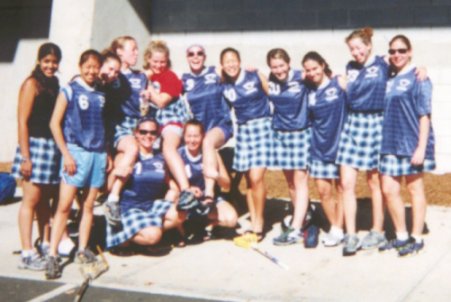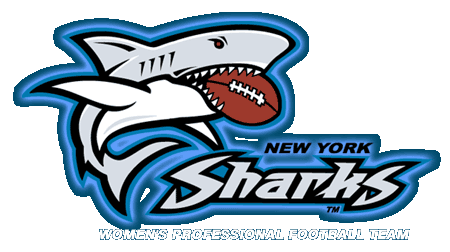Playing
out identity
by Maya Jex
Produced for the Web by Yael Bizouati
Even harder
for the New York Sharks than overcoming skepticism, financial
crises and structural difficulties in the Women’s
Professional Football League, has been the struggle to
win public acceptance for women involved in a sport so heavily
associated with testosterone, beer and bodily injury.
Football,
said Andra Douglas, team owner and occasional quarterback,
is "the last bastion" left for women athletes to conquer.
"People
say ‘how could a woman take a hit like that?'" said Crystal
Turpin, the Sharks’ assistant general manager, bemoaning the
difficulty of getting the public behind the idea of women
playing professional football. "But we run track, play basketball,
baseball, lacrosse and have babies. We're just as physical
as men."
| "The
dyke stigma is hard to shake" |
The challenges
are still daunting, among them, the stubborn and subversive
stereotype that "only butchy girls play sports." The Sharks
come in every size, weight, age, race and sexual orientation
and hold down day jobs from lawyers to construction workers,
from architects to cops. As one of eight franchises in the
Women's Professional Football League, the team completed its
first full season in March with a 4-2 record, playing full-contact
tackle football with the same rules as the NFL, only with
a slightly smaller ball. In such a setting, the "dyke" stigma
is hard to shake.
As Pat
Griffin, the author of "Strong Women, Deep Closets," put it,
"The more lesbians are made invisible, the more the stereotype
of lesbians as sex predators is allowed to stand. It sets
out the stereotype that women athletes have something to fear
in lesbian coaches and older athletes." Griffin, a former
coach, is a professor at University of Massachusetts at Amherst.
The terror
also spreads to parents who then become wary of allowing their
daughters to play sports for fear their daughters will become
lesbians by association. This fear also harms young female
athletes, both lesbian and straight, who don't want to be
associated with what they perceive to be negative stereotypes.
"Why say
it's a non-issue?" Griffin said. "Why not just say yes, there
are lesbian players rather than brushing it off?" She pointed
out that divisions can develop between athletes through such
denials.
Griffin
said that the WNBA recently
made available a list of married and engaged players, pointing
out the fact that the league, where no women are openly gay,
felt a need to distribute such a list is telling.
"And the
list isn't that long," said Griffin.
The Sharks
have done their bit to break down stereotypes tagged to women
athletes, by making athletic ability – not the sexuality of
various players -- paramount.
Turpin
added, "Players are coming to games with their kids and husbands
and sometimes women come out with their girlfriends. Sexuality
is not an issue and I can't see that it would become one.
We have all kinds of women, people in relationships whether
they be with men or women, positive people that have lives
and futures."

Brandeis University
Lacrosse team. |
The Sharks
represent one facet of a new attitude in the world of women's
sports. Tina Ho, co-founder of the lacrosse club at Brandeis
University, represents another. "It's nice to get dressed
up and have people see your muscles and say 'she's an athlete,
that's sexy.' Culturally, we're in a time where it's much
more acceptable to be a strong, solid girl. We should celebrate
that," she said. Ho is part of a generation of young athletic
women who are ready to own their sexuality and power.
However,
when Ho's team voted to give up their new shorts for the more
traditional kilt, she felt that they were caving to external
pressures.
"Skirts
in women's sports were something that was imposed on us in
the past. It's ironic that Brandeis has given us the
power to choose our uniforms and we have chosen not to exercise
our power. It's purely a decorative piece of clothing."
Ho said
that one of the arguments the team made in favor of kilts
was that they were out there to "play as women" and not to
"sacrifice their femininity," an argument she finds ridiculous.
| "It
totally goes against the progressive spirit of female
athletics." |
"I hate
to say it, the team was really excited about looking cute
on the field," she said. "It belittles our whole experience
out there and makes me embarrassed. It totally goes against
the progressive spirit of female athletics."
Despite
what she believes is the conformist attitude of her teammates,
Ho has not let go of her convictions, even making a speech
to her teammates before their first game and writing an editorial
about the decision for the school newspaper.
"Still,
I am the only person who plays in shorts," she said. "I felt
really disappointed about that. I thought that if I played
in shorts more women would be inspired to. I lead by example
that is all I can really do."
Pat Griffin
believes women's sports as a whole would benefit from a more
open dialogue about homosexuality in the athletic world. She
thinks a willingness from professional athletes to be open
about their homosexuality would have positive long-term results.
"In the
short run, there's an adjustment period, but if you read the
stories of famous athletes that have come out, not one regrets
the decision," Griffin said. "It provides the people around
them with a chance to grow and learn rather than live in ignorance.
There are more ‘out’ young athletes coming into college and
going into the professional ranks than ever before. They are
out and they are not going back in. They have more of a sense
of entitlement and are not afraid to use the legal system."
Athletes
such as tennis player Amelie
Mauresmo have come out of their own accord, rather than
in response to an "outing" either by the press or a former
lover.
NEXT: How women respond >>
|
![]()


